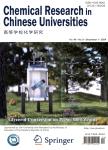Resting Study of Tracer Experiment on Catalytic Wet Oxidation Reactor under Micro-gravity and Earth Gravity Conditions
Resting Study of Tracer Experiment on Catalytic Wet Oxidation Reactor under Micro-gravity and Earth Gravity Conditions作者机构:School of Environmental Science and Engineering Shanghai Jiaotong University Shanghai 200240 P. R. China
出 版 物:《Chemical Research in Chinese Universities》 (高等学校化学研究(英文版))
年 卷 期:2005年第21卷第6期
页 面:702-706页
核心收录:
学科分类:081705[工学-工业催化] 08[工学] 0817[工学-化学工程与技术]
主 题:Tracer study Micro-gravity Dispersion model Tank in series model Catalytic wet oxidation
摘 要:The International Space Station(ISS) employs catalytic wet oxidation carried out in a Volatile Reactor Assembly (VRA) for water recycling. Previous earth gravity experiments show that the VRA is very effective at removing polar, low molecular weight organics. To compare the reactor performance under micro-gravity and Earth gravity conditions, a tracer study was performed on a space shuttle in 1999 by using 0.2% potassium carbonate as the chemical tracer. In this paper, the experimental data were analyzed and it is indicated that the reactor can be considered as a plug flow one under both micro-gravity and earth gravity experimental conditions. It has also been proved that dispersion is not important in the VRA reactor under the experimental conditions. Tracer retardation was observed in the experiments and it is most likely caused by catalyst adsorption. It is concluded that the following reasons may also have influence on the retardation of mean residence time : (1) the liquid can be held by appurtenances, which will retard the mean residence time; (2) the pores can hold the tracer, which can also retard the mean residence time.



